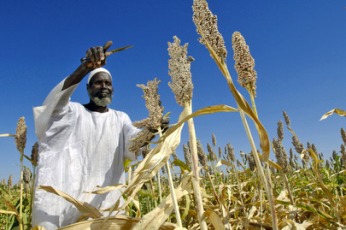Saudi agricultural company to invest in Sudan, says executive director
January 3, 2014 (KHARTOUM) – The executive director of the Saudi agricultural company, Iktifaa, Mohamed Ibn Saeed Al-Atiya, has announced that his company will establish agricultural and animal projects in Sudan’s state of Sennar and the Northern state to produce grain and cattle feed.

He said that the chairman of Iktifaa’s board of directors, Prince Abdel-Aziz Ibn Mashaal Ibn Abdel-Aziz directly instructed the company to invest in Sudan within the framework of King Abdalla Ibn Abdel-Aziz initiative for achieving Arab food security.
Al-Atiya, who met with the agricultural minister Ibrahim Mahmoud Hamid, said that he visited the two states and saw their plans to attract Arab investments in agriculture particularly investments from Gulf States, adding that he was briefed on the investment opportunities in the agricultural and animal sectors.
He asserted Sudan was among the first countries which responded to King Abdalla’s initiative for achieving Arab food security, saying that Sudan enjoys vast resources including large agricultural land, animal wealth, and water.
The governor of the Northern state, Ibrahim Al-Khidir, for his part, said Saudi Arabia has 40 years of experience in agricultural investments and stressed that his state has unparalleled fertile land, pointing out that integration between the two countries would lead to food self-sufficiency in Saudi Arabia, Sudan and the Arab world.
Last year, Sudan signed an agricultural cooperation agreement with Beijing which gives Chinese companies several options to operate in Sudan.
The accord aims at promoting Sudan self-sufficiency and exporting surpluses to China and the rest of the world to contribute to solving the world’s food shortage.
Once hoped to be the breadbasket of the Arab world, Sudan’s agricultural sector has continued to deteriorate over the years mainly as a result of negligence, drought, mismanagement, high taxes and the overall economic climate.
Sudanese farmers often complain about the high costs of imported materials such as fertilizers. Many of them were sent to jail as their debt piled up.
Foreign investors also complain about lack of infrastructure and unfriendly laws which they say deters them from putting money in Sudan’s vast farmlands.
In May of last year, a Saudi investment firm said it will hold off its planned agricultural project in Sudan to produce wheat and other basic food items until the government eases a ban to repatriate profits.
(ST)
